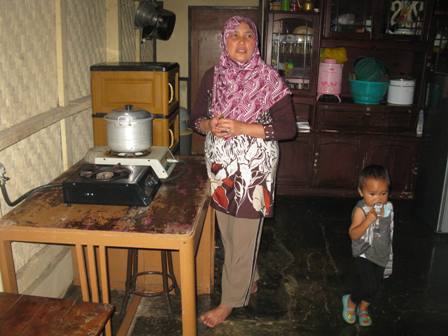Too Precious to be Wasted

Alternative energy innovation does not have an ending. Energy resources such as sun, wind, biodiesel and water as an alternate for petrol and gas are optimally utilized; even waste has been proved in producing energy.
Dati, a villager of Cibodas, Bandung, West Java, has succeeded to press gas using for her family daily use. Biogas produced by her cow dung is capable to live the kitchen and lower down gas consumption.
According to Dati, her family had lower down the expenses for kerosene since using biogas by her cow dung for about one year until now. She could light up kitchen fire for two hours long just by her two cows. The fire is blue and does not give black stain on her pan or any other cooking equipment.
“I don’t use gas for cooking anymore,” said Dati. The outcome appears more economical compared to the times before she used biogas from her cow dung.
She knowledge biogas from KPSBU (Milk Cooperative) who offered economical ways in pressing down household expenses by biogas; storing methane gas from cow dung to be channeled through a pipe into the kitchen stove. Dati built the biodigester with credits from KPSBU paid with her cow milk installment payment worth IDR 50,000.
Biogas is relatively new in her area. It is well utilized along with its bio-slurry which is used as fertilizer for vegetable plantation; as how she made in her house yard, planted with broccoli and a range of flowers to beautify her house. “Now there is not a single disappointing harvest,” Dati acclaimed.
Thus it is not for only the users of biogas the positive advantages go to but also to other part of the society who consume organic vegetable by using bio-slurry.
Just a few days ago the cows stalled at the back of her house moved to another place. Nevertheless, this does not stop Dati from processing biogas. She came to the thought to take her neighbour’s cow dung to keep her digester operated and light fire for her kitchen needs. She is delighted to take her neighbour’s waste as how the neighbor is relieved by their waste. (Dina Sulistyaningsih)

